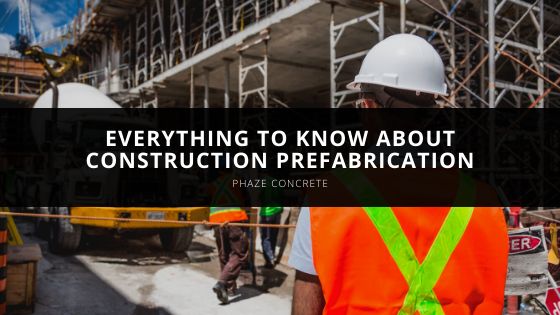Experts at Phaze Concrete explain what construction prefabrication is and how it makes the building process faster.
Over the past few years, prefabrication has been a hot topic in the construction industry and is usually associated with offsite and modular construction. Construction sites are often in dense urban areas with little space, or in rural hard to reach areas that are growing. Either way, transporting materials and machinery can be an issue, which raises costs and extends project timelines. Phaze Concrete, leading experts in the construction industry, reveal that prefabrication can be the answer to all the problems mentioned above.
Prefabrication is the process of making materials at a different location that is more suited for its construction. When the pieces are finished, construction companies transport them to the construction site for assembly and setup. Although prefabrication has gained traction in conversation recently, Phaze Concrete experts reveal it has been around for thousands of years, dating back to 3,800 BCE in England.
Although builders have less flexibility when it comes to the final building design, there are many benefits to the prefabrication process for commercial projects, contractors, and stakeholders. Phaze Concrete experts believe five benefits, in particular, are worth noting.
- Labor & Time
The push for formal college educations has led to a decline in the construction and trade workforces. Contractors are struggling to fill positions and find laborers in various fields, but the building process must go on. Phaze Concrete experts believe the prefabrication process allows companies to be more productive and efficient with the workers they have because there are fewer things to build and piece together onsite. Construction companies can offer shorter timelines, which is essential for winning bids in the competitive industry.
- Cost
Construction companies are finding projects to be much more cost-effective thanks to prefabrication. It costs less to move partial assemblies from a factory than it does to bring pre-production materials to every construction site. Phaze Concrete experts note that with increased productivity comes money saved on personnel.
- Quality Control
When products are assembled at factories designed explicitly for their construction, the results are more consistent. Factory tools add quality control to materials and allow construction companies to control the production environment better. Phaze Concrete experts explain that most factories have indoor environments that eliminate production threats from unpredictable weather. Plus, permanent machinery is much safer than factory tools that must be moved, set up, and taken down.
- Environmental Impacts
Prefabrication reduces the ecological impact caused by construction. Areas surrounding job sites will have less disturbance because workers won’t need extra room for assembly and material creation. Phaze Concrete believes that prefabrication also contributes to less pollen because there is overall less movement at the construction site. Modular construction helps reduce water usage and allows materials to be recycled easily.
- Security
The longer a job takes, the more risk the company takes for a chance of vandalism or theft. When machines, tools, and construction pieces are left unattended and unassembled, they are easier to damage or carry away. Prefabrication allows components to be delivered in packages meaning it can go up quickly and be secured.


